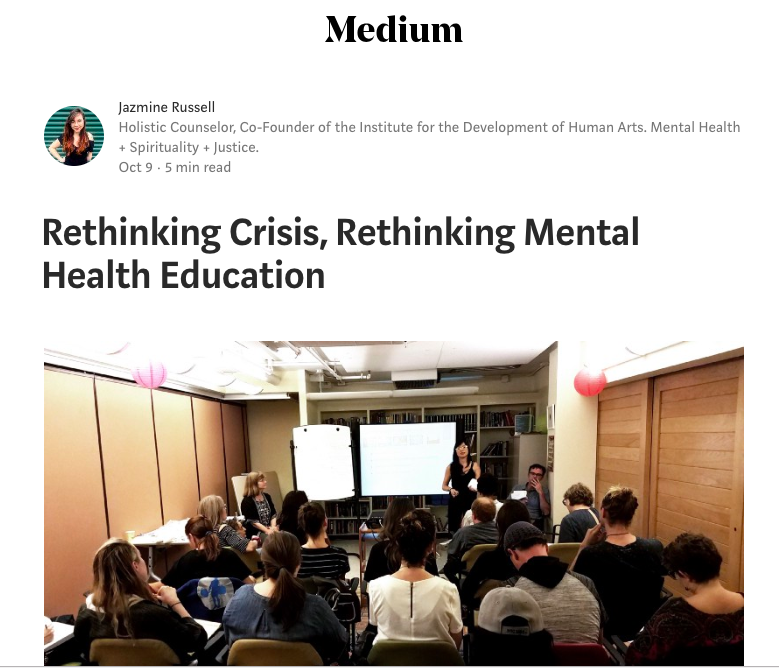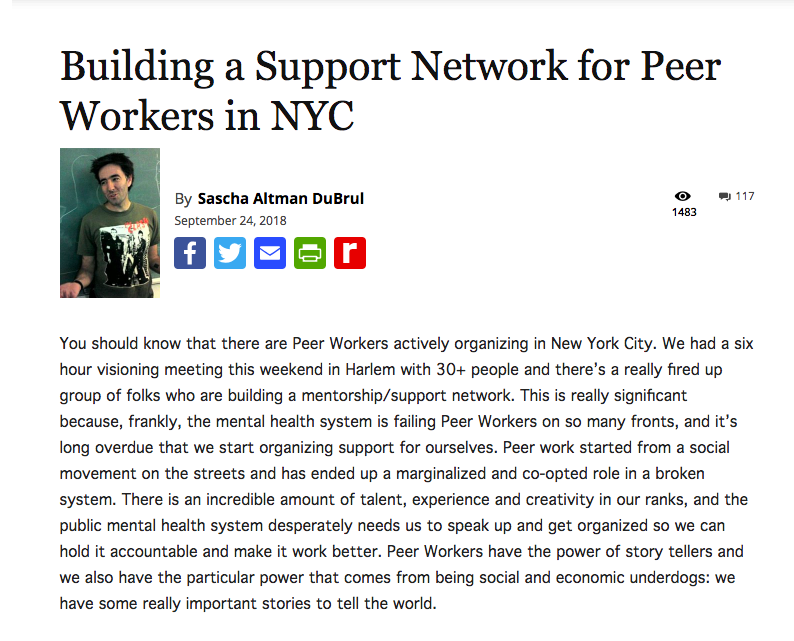
For press inquiries, please email: press@idha-nyc.org
What mental health activists are saying about the 988 suicide hotline
August 4, 2022 | USA Today
“Some mental health activists, providers, researchers and the general public cautioned potential callers that national and local crisis hotlines maintain connections with 911, even if those ties are loose. Mental health advocates aren’t suggesting people should avoid seeking help, but they envision a different system. "988 is not a panacea," said Jessie Roth, who directs the New York City-based mental health education nonprofit Institute for the Development of Human Arts.” Read More →
Mental Health and Racial Justice: Why Advocates Want to Get Police Out of Crisis Responses
October 1, 2020 | KQED
“During a recent panel discussion hosted by the Institute for the Development of Human Arts, which provides training and resources for shifting policy and practice in mental health care, experts from all over the country shared strategies and successes around eliminating law enforcement from crisis care. More than 4,000 people registered for the discussion via Zoom, and the recording of the panel has since been viewed thousands of times.” Read More →
Decarcerating Care — Institute for the Development of Human Arts
September 13, 2020 | The Sanctuary for Independent Media
“The Institute for the Development of Human Arts, IDHA, is holding a virtual event on Monday, September 14 from 6 – 8 pm called Decarcerating Care: Taking Policing Out of Mental Health Crisis Response. HMM correspondent Corinne Carey spoke with IDHA’s Noah Gokul and Jessie Roth about the event, which addresses one of the most critical questions facing our nation right now: what alternatives exist to police responses to mental health crises?” Read More →
Bedlam: Public Media, Power, and the Fight for Narrative Justice
May 10, 2020 | Mad in America
“Following Bedlam’s premiere last month, IDHA members moved from outrage into action. Their Open Letter to PBS, which has since been signed by more than seventy civil rights, survivor-led, and disability organizations, shares a vision for a future “in which ex-patients, survivors, and currently and previously incarcerated individuals are not merely depicted in mental health narratives, but given the agency to tell their own stories. […] IDHA, which runs a school for “Transformative Mental Health,” also has organized a two-hour online community discussion in response to Bedlam on May 11. DuBrul will moderate the event.” Read More →
“Not Fragile”: Survivor-Led Mutual Aid Projects Flourish in a Time of Crisis
March 30, 2020 | Mad in America
“In addition to the mutual-aid projects detailed above, there is an ever-expanding number of projects run by survivors and allies. […] The Institute for the Development of Human Arts, a grassroots school for “transformative mental health,” recently held an online Transformative Mutual Aid Practices (T-MAPs) workshop geared toward the current crisis; the group will host a Community Open Mic on March 30.” Read More →
CityViews: Is New York’s Mental-Health System Listening to the Peers Who’ve Lived It?
February 13, 2019 | City Limits
“From the first time, IDHA was welcoming,” says Thompson. “It’s just amazing to connect with such talented people, who are open. I didn’t feel any stigma. There wasn’t a focus on your diagnosis. I don’t feel this paternalistic thing. There’s an even playing ground.” IDHA Peer Connection has expanded to over 50 members and four peer committees, and is in the early stages of an organizing campaign built around a Declaration of Peer Roles. The initiative will begin with a survey sent to working peers across the city to be used to develop a scope of practice document.” Read More →
Rethinking Crisis, Rethinking Mental Health Education
October 9, 2018 | Medium
“IDHA was founded on the belief that the most expansive learning opportunities in mental health happen in collaboration between professionals and ‘experts by experience,’ or those who have been through the mental health system and can offer immense insight and first-person accounts of what needs to shift in order for mental health care to truly support those it seeks to serve. To do this, we step beyond the 4th wall, break the invisible barrier between teacher and student, create space for challenging conversations and multiple perspectives to take place, and blend professional expertise with something we consider to be crucial to learning: the connection and vulnerability of personal narrative.” Read More →
Building a Support Network for Peer Workers in NYC
September 24, 2018 | Mad in America
“You should know that there are Peer Workers actively organizing in New York City. We had a six hour visioning meeting this weekend in Harlem with 30+ people and there’s a really fired up group of folks who are building a mentorship/support network. This is really significant because, frankly, the mental health system is failing Peer Workers on so many fronts, and it’s long overdue that we start organizing support for ourselves. Peer work started from a social movement on the streets and has ended up a marginalized and co-opted role in a broken system. There is an incredible amount of talent, experience and creativity in our ranks, and the public mental health system desperately needs us to speak up and get organized so we can hold it accountable and make it work better. Peer Workers have the power of story tellers and we also have the particular power that comes from being social and economic underdogs: we have some really important stories to tell the world.” Read More →
The Next Generation of the Mad Movement in NYC Looks Like This
June 13, 2017 | Mad in America
"Part of the beauty of IDHA is that it rests at the confluence of multiple movements and generations and there are some super talented and passionate people involved in the mix. Projects like IDHA represent a new wave of resistance that is less about human rights and individual choice and more about the insistence on full-fledged participation in our own healing, and more importantly, in healing by and through community. There’s also something about the collaboration between people working on the ground and people in the academy, collaboration between Peer Specialists and conscious clinicians, collaboration between artist movements and mental health activists." Read More →
Ethics Check: Realigning with the Values of the Healer’s Heart
December 1, 2017 | GoodTherapy
"The [Institute for the Development of Human Arts], a collaborative think tank, has come together to refocus on the values at the heart of human healing. Their first eight-week course, “Rethinking Crisis,” creates a framework for exploring and understanding the challenges in our current mainstream systems while laying the groundwork to co-create a new paradigm that can better reflect the ethical codes that guide our professions. Being in classes with diverse professionals and experiencers with backgrounds that clearly demonstrate how many of our systems have unintentionally created harm in the interest of healing has given me the opportunity to learn and further sensitize myself to the ways I engage with the people I work with." Read More →










